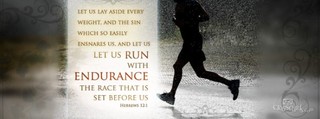
- Recent Translations
- All Translations
Xībóláishū 12:3
Share
Settings
Xībóláishū 12:3 Meaning and Commentary
For consider him
In the greatness of his person, as God, the Son of God, the heir of all things; and in his offices of prophet, priest, and King, as the Saviour of lost sinners, the Leader and Commander of the people, as the apostle and high priest of our profession: consider him in his human nature, his conversation on earth, and what he did and suffered for men; how that in his nature he was pure and holy, in his conversation harmless and innocent, in his deportment meek and lowly; who went about doing good to the souls of men, and at last suffered and died, and is now glorified: consider the analogy between him and us, and how great is the disproportion; and therefore if he was ill treated, no wonder we should consider him under all his reproaches and sufferings:
that endured such contradiction of sinners against himself;
against his person, they denying his deity, and speaking against his sonship, and against his offices; mocking him as a King, deriding him as a prophet, and treating him with the utmost contempt as a priest and Saviour; and against his actions, his works of mercy to the bodies of men, when done on the sabbath day; his conversing with sinners for the good of their souls, as if he was an encourager of them in sin, and a partner with them; his miracles, as if they were done by the help of the devil; and against the whole series of his life, as if it was criminal. Now we should analogize this contradiction, and see what proportion there is between this, and what is endured by us: we should consider the aggravations of it, that it was "against himself"; sometimes it was against his disciples, and him through them, as it is now against his members, and him in them; but here it was immediately and directly against himself: and this he endured "from sinners"; some more secret, as the Scribes, Sadducees, and Pharisees; some more open, as the common people; some of them the vilest of sinners, the most abandoned of creatures, as the Roman soldiers, and Herod's men of war: and this should be considered, that we cannot be contradicted by viler or meaner persons; and it is worthy of notice, with what courage and bravery of mind, with what patience and invincible constancy he endured it: this should be recollected for imitation and encouragement,
lest ye be wearied, and faint in your minds;
contradiction is apt to make persons weary and faint, as Rebekah was, because of the daughters of Heth, and as Jeremiah was, because of the derision of the Jews, ( Genesis 27:46 ) ( Jeremiah 20:8 Jeremiah 20:9 ) but a consideration of Jesus, and of what he has endured, tends to relieve the saints in such a condition; See ( Matthew 10:25 ) ( Luke 23:31 ) .

